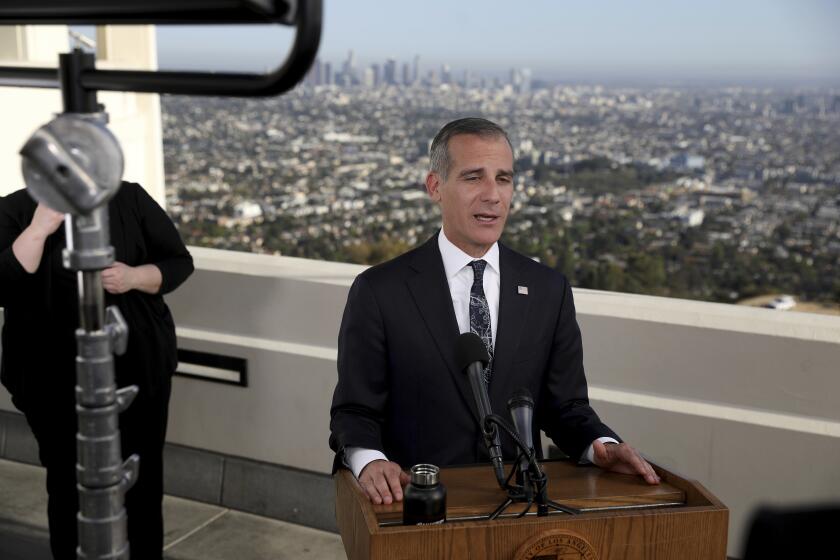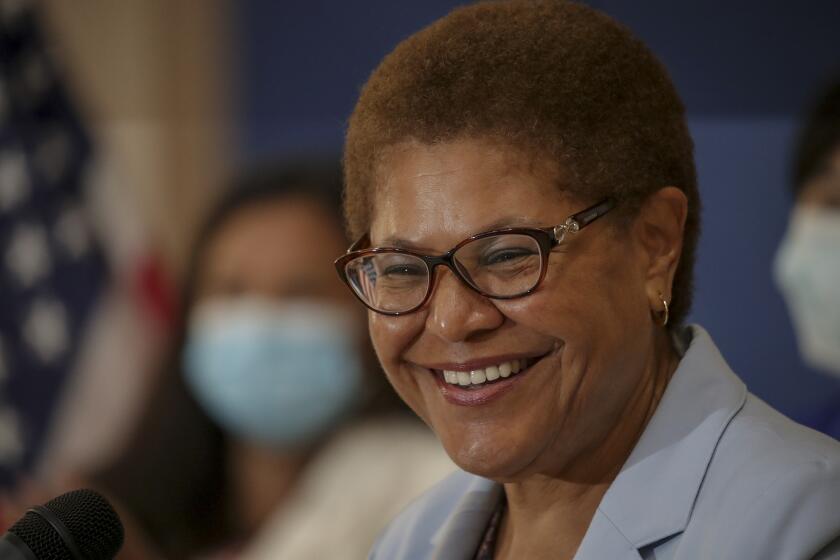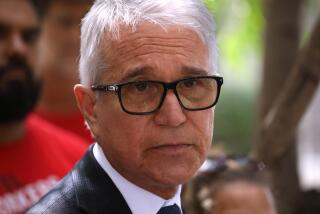Momentous mayor’s race will be a pitched battle over how to fix L.A.’s ills

For much of the past year, the contest to become Los Angeles’ next mayor has been a sleepy affair, barely registering with voters and drowned out by a quixotic statewide recall election.
All that changed this week, with a succession of candidates revealing — either directly or through surrogates — that they were joining the increasingly crowded race to replace Mayor Eric Garcetti. The most prominent name yet is U.S. Rep. Karen Bass (D-Los Angeles), whose supporters confirmed Friday that she intends to run for the office.
Voters now have a much clearer picture of next year’s contest to replace Garcetti, who faces term limits. And the candidates will soon need to explain in detail how they will confront the many problems facing the city, including a homelessness crisis that overshadows nearly every other issue.
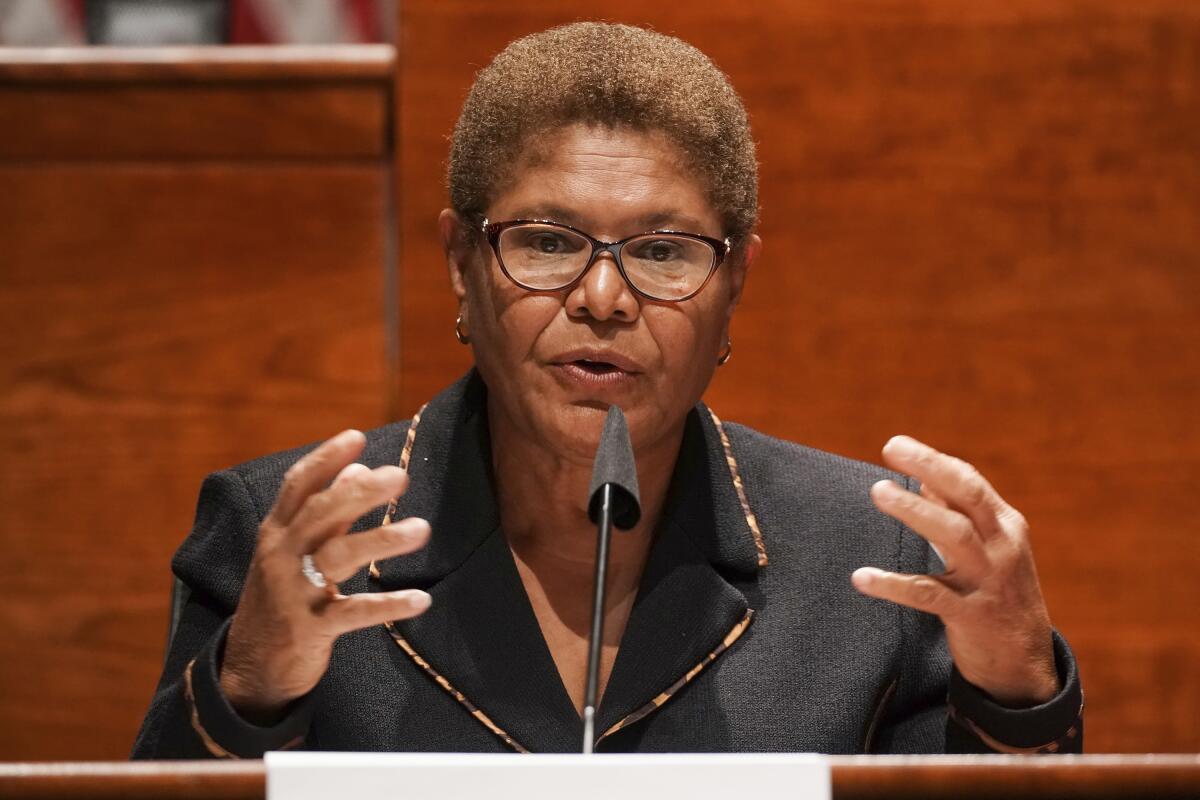
Over the next eight months, the candidates will have to reveal their views on how large the Los Angeles Police Department should be, and whether its responsibilities should be scaled back to reduce the potential for deadly interactions with the public; how to make housing more affordable, as rents and home prices push skyward; and what solutions will, once and for all, get people off of the streets.
Voters could select a mayor who pulls the city — already dominated by Democrats — politically further to the left. Or they could find someone closer to the center.
It’s not easy being L.A.’s mayor. With Eric Garcetti poised to leave for India, experts debate what the city needs in a successor.
Los Angeles has not had a wide-open mayoral election since 2013, when Garcetti, then a councilman, prevailed over then-City Controller Wendy Greuel. The city has changed politically since then, with its policies and electorate becoming more progressive.
The race currently features City Atty. Mike Feuer and City Councilmen Kevin de León and Joe Buscaino. Two business leaders, Jessica Lall and Mel Wilson, have also have joined the contest. All five are Democrats.
The arrival of Bass will “create havoc” among those candidates, who are attempting to carve out a path for themselves among different voter groups, said Jaime Regalado, emeritus professor of political science at Cal State Los Angeles. Bass has developed a national political profile while in Washington, appearing regularly on news shows and being considered for a U.S. Senate seat and as President Biden’s running mate.
“She’s a darling of the left. She’s not afraid to speak her mind. But she’s also willing to work with the other side of the aisle,” Regalado said.
The mayoral primary election is in June 2022, followed by a runoff between the top two vote-getters in November 2022.
With the candidate pool growing, the competition for different geographic regions, ethnic groups and political factions has grown more complex.
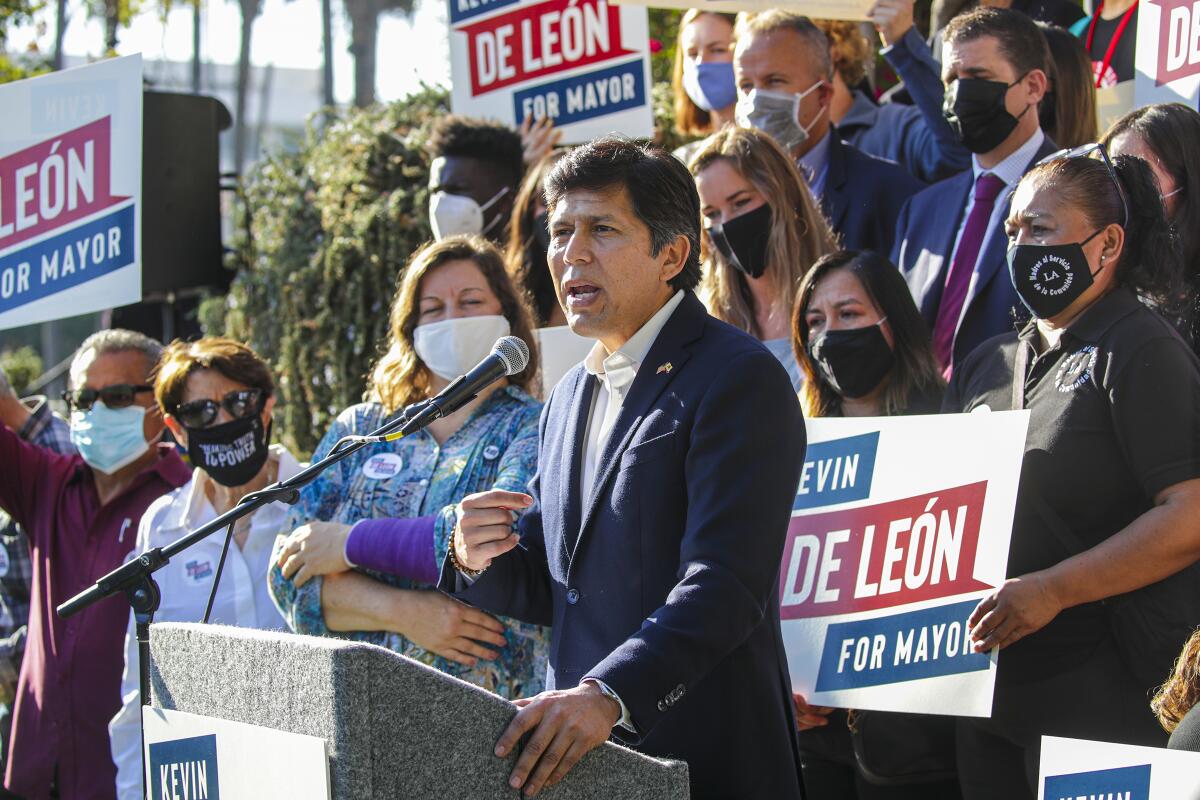
Bass, who is Black, represents some of the city’s more predominantly Black neighborhoods, but is also seen as popular on the liberal Westside. De León, a fluent Spanish speaker, is Latino in a city that is half Latino, but is also known for his advocacy on environmental issues.
Wilson, who is also Black, has spent decades as a civic leader in the vote-rich San Fernando Valley, which makes up about 40% of the city’s population. Feuer, who is Jewish, is the only candidate to have been elected citywide, securing his seat in 2013 and again four years later.
Lall, who is of Indian descent, touts herself as someone with progressive values who believes in “practical solutions.” And Buscaino seized early and often on the issue of homelessness, arguing that voters are sick of pilot programs and protracted studies — and want to see action.
“I think we’re at a crossroads,” said Michael Trujillo, a Buscaino campaign advisor. “Do we want a city that functions well and builds on the quality of life for Angelenos, or do we want to go down a path that lets Burning Man occur on our city streets every night?”
Still unknown is whether real estate developer Rick Caruso, known for the Grove and Americana at Brand shopping centers, will enter the race, potentially pulling centrist and more conservative votes away from Buscaino. Former L.A. Unified schools Supt. Austin Beutner, who has been popular among business leaders, also has been exploring a mayoral bid.
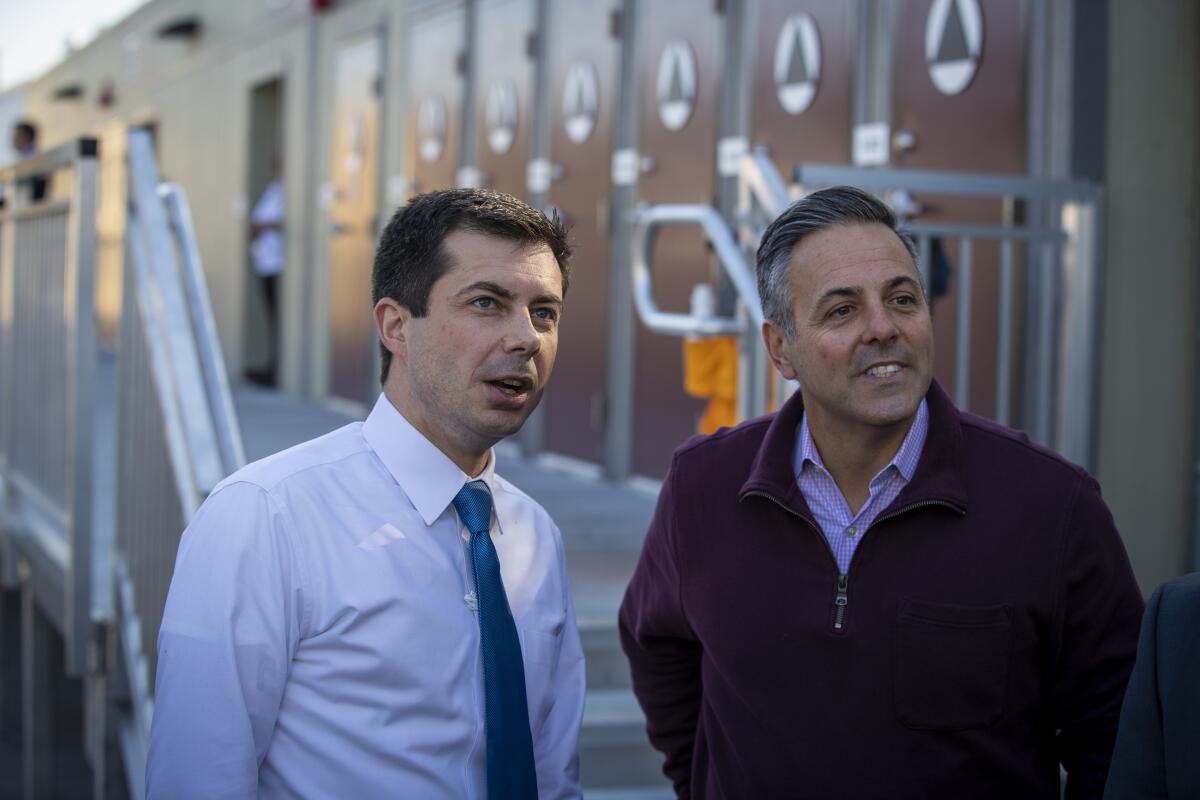
Polls show that for now, homelessness remains at the top of voters’ minds. Thousands of beds have been opened in new shelters, tiny homes and other facilities over the past year, yet tents still line many of the city’s sidewalks and other public spaces.
Buscaino has already raised more than $1 million for a proposed ballot measure to deal with homelessness. But other candidates have also waded into the topic.
De León regularly promotes his push for the construction of 25,000 units of homeless housing. Lall has argued for L.A. to create its own health department, so that it can provide mental health and substance abuse services. Feuer, for his part, recently called on county officials to clear an encampment on the Westside where two homeless men have been killed so far this year.
Voters are genuinely worried about the future of the city, which is facing a spike in gun violence, a protracted homelessness crisis and struggling to bounce back from the pandemic, Feuer said in an interview.
“This is going to be about a city in crisis, and who steps in and takes charge and tackles the most important problems in the city right away,” he said.
Lall struck a similar note.
“The soul of Los Angeles is on the line. I really believe that,” said Lall, who heads the downtown-based Central City Assn.
Despite the public’s frustration, one expert voiced doubts that a “law and order” approach to homelessness will resonate on the campaign trail.
Any candidate who promises simply to “clean up the streets,” without offering other solutions, is not going to succeed, said Tommy Newman, vice president for engagement and activation at the United Way of Greater Los Angeles.
“Even amongst your people who do not describe themselves as progressive, they know that chasing people from one corner to another is not an actual solution,” said Newman, who has worked previously on city election campaigns.
In recent months, crime has not risen to the top of voter surveys. Nevertheless, some at City Hall have grown worried about this year’s crime figures.
Homicides are up 42% this year, compared with the same period in 2019 — the last full year before the pandemic. The number of shooting victims has seen a similarly sized increase, coinciding with a decline in the number of rank-and-file officers at the LAPD.
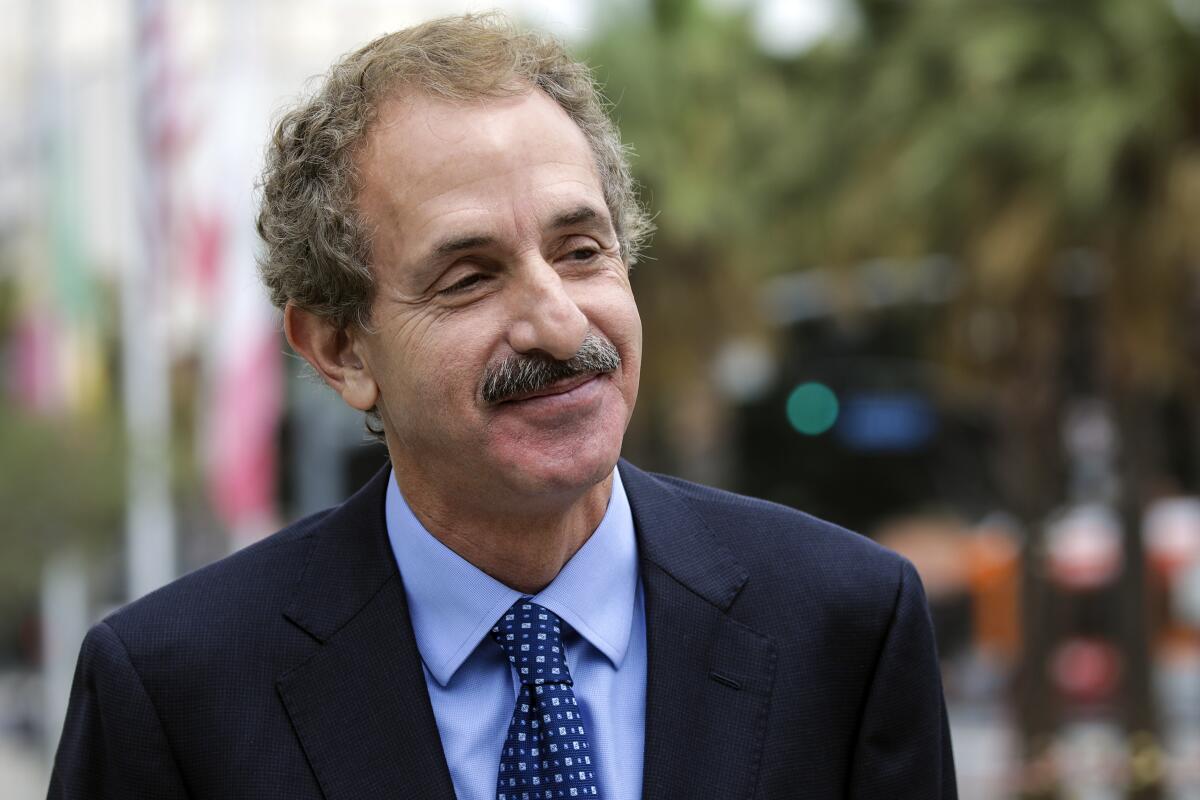
Wilson, a real estate broker who has been courting voters in the Valley and South Los Angeles, argued firmly against efforts to cut LAPD spending.
“When I talk to people in Watts, no one wants to defund the police,” said the Northridge resident.
The addition of Rep. Karen Bass to the L.A. mayor’s race would deliver another shakeup to a contest that had been a sleepy affair for much of the last year.
If public safety does take hold as an issue, L.A.’s mayoral election could see parallels to the Democratic primary in New York. In that city, Brooklyn Borough President Eric Adams, a former police officer, won after running a campaign focused centrally on rising crime.
The top two contenders in the Democratic primary — Adams and former Sanitation commissioner Kathryn Garcia — were moderates.
Adams, who is Black, prevailed in communities of color but lost in the wealthy borough of Manhattan. The average median income of assembly districts he won was $55,000, Bloomberg reported.
What initially began as a race about the city’s economy became predominantly about crime — which played to Adams’ strength, said Lupé Todd-Medina, a New York City political strategist who worked for Ray McGuire, a former banker who ran in the mayoral race.
“People, in general, are moderate. I think that idealists are left, but generally, most people are in the middle,” Todd-Medina said.
Courtni Pugh, De León’s strategist, said she is reluctant to draw comparisons to New York’s election, since that city used a “ranked choice” voting system. In Los Angeles, the city’s economic recovery and getting people back to work will dominate the discussion in the mayor’s race, she said.
During his campaign kickoff on Tuesday, De León repeatedly highlighted his own experiences with poverty, as the son of a single mother who struggled to pay the rent. Pugh predicted socioeconomic issues would resonate among voters, saying Los Angeles “is becoming a tale of two cities.”
Bass and De León, frequently portrayed as the most progressive of the growing pool of candidates, could find themselves squaring off in the November 2022 runoff. Or, either one of them could face a more moderate rival.
In recent mayoral contests, it was clear early on which two candidates were likely to make the runoff, said political consultant Bill Carrick, who represents Lall. That’s not the case this time around, he said.
“It’s a much more wide open race than we’ve had before,” he said.
More to Read
Sign up for Essential California
The most important California stories and recommendations in your inbox every morning.
You may occasionally receive promotional content from the Los Angeles Times.
